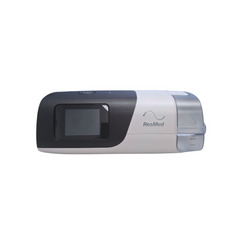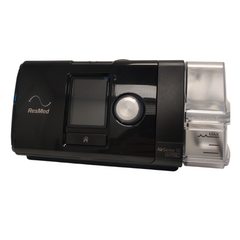Key Takeaways:
- Machine Functionality: CPAP uses a single pressure; BiPAP alternates pressures for inhalation and exhalation.
- User Suitability: BiPAP is generally for more complex cases, while CPAP is the go-to for most obstructive sleep apnea patients.
- Access and Affordability: Help Medical Supplies offers both machines — including refurbished models — for affordable, insurance-free treatment options.
Sleep apnea affects millions of people, many of whom aren’t aware that their fatigue, poor concentration, or snoring may be tied to disrupted breathing during the night. Two of the most common treatments, CPAP and BiPAP, are proven to help restore healthier sleep by keeping airways open. But despite their shared purpose, they work in different ways and are intended for different types of patients. Understanding how they compare can help you feel more confident when choosing the right equipment for your condition.
With thousands of satisfied customers and a top-rated catalog of CPAP, BiPAP, and oxygen therapy equipment, Help Medical Supplies has earned a reputation as one of the most trusted online destinations for affordable, direct-to-consumer respiratory care. We specialize in offering brand-new and certified refurbished machines, making high-quality sleep apnea treatment accessible without the complexity of insurance or inflated pricing. When it comes to supporting better sleep and breathing, our experience speaks for itself.
In this piece, we will be discussing the differences between CPAP and BiPAP machines, who they’re for, and how to know which option may be right for your sleep apnea therapy.
What Is Sleep Apnea, And Why Does Treatment Matter
Sleep apnea is a serious sleep disorder in which breathing repeatedly stops and starts throughout the night. The most common type, obstructive sleep apnea (OSA), occurs when the muscles in the throat relax excessively during sleep, causing the airway to become blocked. This can lead to loud snoring, gasping for air during sleep, and long-term health complications if left untreated.
Sleep apnea doesn’t just disrupt rest; it can also contribute to issues like high blood pressure, heart disease, type 2 diabetes, and depression. People with untreated sleep apnea often struggle with daytime fatigue, poor concentration, and reduced quality of life.
Effective treatment helps keep the airway open during sleep, allowing for consistent breathing and uninterrupted rest. That’s where machines like CPAP and BiPAP come into play. These devices deliver pressurized air to the airway, but they do so in different ways, and choosing the right one depends on your specific needs. Skip the insurance delays and inflated prices. At Help Medical Supplies, you’ll find top-rated CPAP and BiPAP machines from leading brands, all available to order directly and affordably.
What Is A CPAP Machine?
A CPAP (Continuous Positive Airway Pressure) machine is one of the most common and widely prescribed treatments for obstructive sleep apnea. It delivers a steady, continuous stream of air through a mask that you wear while sleeping. This airflow keeps your upper airway open, preventing pauses in breathing.
CPAP machines are effective for people with mild to moderate obstructive sleep apnea. They’re typically set to a single pressure level that stays consistent throughout the night. While some users may need time to adjust, CPAP therapy is considered the gold standard for treating OSA due to its reliability and effectiveness.
Modern CPAP machines are more compact and feature-rich than ever. Many include features like heated humidifiers, auto-adjusting pressure settings (APAP), and data tracking. At Help Medical Supplies, we offer both new and refurbished CPAP machines, making high-quality therapy more accessible for those who are paying out of pocket.
What Is A BiPAP Machine?
A BiPAP (Bilevel Positive Airway Pressure) machine also helps keep your airway open during sleep, but it delivers two different pressure levels: a higher pressure when you inhale and a lower pressure when you exhale. This makes breathing feel more natural, especially for people who struggle to exhale against the constant pressure of a standard CPAP.
BiPAP machines are often prescribed for people with more complex breathing conditions, such as central sleep apnea, chronic obstructive pulmonary disease (COPD), or certain neuromuscular disorders. They may also be used when CPAP therapy isn’t well-tolerated or effective.
Because of the dual-pressure settings, BiPAP machines can offer greater comfort for some users. However, they are usually more expensive than CPAP devices and are typically recommended after a sleep study or physician evaluation. Help Medical Supplies carries a wide range of BiPAP machines, including refurbished units that offer the same performance at a more affordable price.
Key Differences: BiPAP Vs CPAP
While both CPAP and BiPAP machines treat sleep apnea by providing pressurized air, they function in distinct ways, and those differences can impact comfort, effectiveness, and cost.
Pressure Delivery
CPAP machines deliver a single, constant level of air pressure throughout the night. In contrast, BiPAP machines alternate between a higher pressure when you inhale and a lower pressure when you exhale, making breathing easier for some users.
Conditions Treated
CPAP is typically prescribed for obstructive sleep apnea and is effective for most cases. BiPAP is often used when CPAP isn’t effective or for more complex conditions like central sleep apnea, COPD, or certain neuromuscular disorders.
Comfort
Some people find exhaling against the fixed pressure of a CPAP machine uncomfortable, especially at higher settings. BiPAP machines reduce the pressure during exhalation, which can feel more natural and improve comfort.
Machine Complexity
CPAP machines are generally simpler to use, with fewer settings to manage. BiPAP machines are more advanced, offering greater customization but requiring a more tailored setup.
Who Should Use A CPAP?
CPAP machines are ideal for individuals diagnosed with obstructive sleep apnea, especially those with mild to moderate symptoms. They’re also a great choice for people who tolerate consistent air pressure well and don’t have additional respiratory conditions.
If you’ve had a sleep study that confirms OSA and your doctor recommends CPAP therapy, starting with a CPAP machine is typically the most cost-effective and straightforward option. At Help Medical Supplies, we offer a range of CPAP devices, including travel-friendly models and refurbished units to suit different budgets.
Who Should Use A BiPAP?
BiPAP machines are typically recommended for people with more complex breathing needs, such as those with central sleep apnea, COPD, or certain neuromuscular disorders. They may also be prescribed when CPAP therapy causes discomfort or isn’t effective.
If you have trouble exhaling against the pressure of a CPAP or require varying pressure levels, a BiPAP machine may offer better relief. Help Medical Supplies carries new and refurbished BiPAP units, making advanced therapy more accessible for those who need it.
Which One Is Right For You?
The choice between CPAP and BiPAP depends on your specific diagnosis, comfort level, and breathing needs. For most people with obstructive sleep apnea, a CPAP machine is the first-line recommendation due to its simplicity and effectiveness.
However, if your condition is more complex or you struggle with CPAP therapy, a BiPAP may be more appropriate. Always consult with your sleep specialist to determine the best option, and when you’re ready, Help Medical Supplies can help you find a machine that fits both your therapy needs and your budget.
Whether you're looking for new or refurbished equipment, our catalog is designed to help you get the sleep therapy you need without compromising on quality. We carry reliable machines that fit real-life budgets.
Where To Find CPAP And BiPAP Machines Online
If you’re looking for a reliable source for CPAP or BiPAP machines, Help Medical Supplies offers a wide selection of trusted brands and models. Whether you need a brand-new device or a professionally refurbished unit, we provide affordable options without requiring insurance.
Our catalog includes machines, masks, and accessories designed to support long-term therapy success. With fast shipping and knowledgeable customer support, Help Medical Supplies is your one-stop shop for sleep apnea equipment.
With years of experience and a growing base of satisfied customers, Help Medical Supplies is the go-to online store for sleep apnea therapy. Our goal is simple: better products, better pricing, and no insurance hoops to jump through.
Final Thoughts
Choosing between a CPAP and a BiPAP machine is an important step in managing sleep apnea effectively. While both options provide essential support for better sleep and long-term health, the right choice depends on your specific diagnosis and comfort level with therapy.
If you’re just starting out or have been prescribed CPAP, a standard machine may be all you need. For those with more complex needs or difficulty adjusting, BiPAP could offer a better solution. No matter where you are in your treatment journey, Help Medical Supplies is here to help you find the right equipment at a price that works for you.
Read Also:
- The Dangers Of Untreated Sleep Apnea
- What You Should Know About Choosing A CPAP Mask
- BiPAP Machine Reviews And Buyer's Guide
Frequently Asked Questions About CPAP Vs BiPAP
Can I switch from a CPAP to a BiPAP on my own?
No, switching from CPAP to BiPAP should only be done under medical supervision. A sleep specialist needs to assess whether BiPAP therapy is necessary based on your condition. While both devices are designed to help people with sleep apnea breathe more effectively, they work in different ways. CPAP delivers continuous air pressure at one steady level, whereas BiPAP provides two different pressure settings, one for inhalation and a lower one for exhalation. This distinction can make BiPAP more comfortable for certain patients, especially those who have trouble tolerating constant pressure.
Is BiPAP always better than CPAP?
Not necessarily. BiPAP is more specialized and is typically used when CPAP is ineffective or not tolerated. For many people, CPAP works perfectly well.
Do BiPAP machines make more noise than CPAP machines?
In general, BiPAP machines might be a little louder due to the constant pressure change when inhaling and exhaling. However, noise can vary slightly depending on the model, brand, and age of the unit.
Can I use the same mask for both CPAP and BiPAP?
Yes, most masks are compatible with both types of machines. However, always check with your supplier or manufacturer to ensure proper fit and compatibility.
Does Medicare or insurance cover BiPAP more easily than CPAP?
In many cases, insurance (including Medicare) requires documentation showing CPAP was ineffective before covering a BiPAP machine. Coverage varies by provider.
Are BiPAP machines more difficult to maintain than CPAPs?
Maintenance is very similar for both. You’ll need to clean the mask, tubing, and humidifier regularly, regardless of the machine type.
Can BiPAP machines be used for travel?
Yes, but they’re often bulkier than travel CPAPs. Some BiPAP models are designed for portability, so it’s important to choose the right unit for your needs.
Will BiPAP help with snoring more than CPAP?
CPAP is usually sufficient to reduce or eliminate snoring caused by sleep apnea. BiPAP is not inherently more effective for snoring unless a medical condition calls for it.
Is there a difference in setup time between CPAP and BiPAP?
CPAPs are generally quicker to set up due to fewer pressure settings. BiPAPs require more specific adjustments, often guided by a sleep professional.
Can I buy a refurbished BiPAP machine?
Yes. At Help Medical Supplies, you can purchase high-quality refurbished BiPAP machines that are tested and sanitized, offering excellent value without sacrificing performance.







